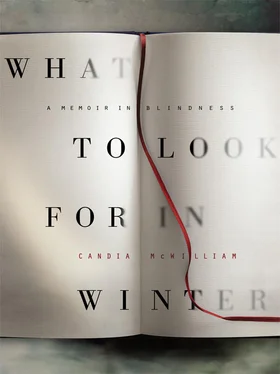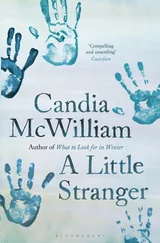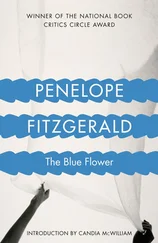Morphine makes me itchy. Junkies often scratch, I remembered now, from gatherings I used to attend under the shared delusion that we were at a party, when gear was another way to spend money with nothing good to show for it. Not, ever, my bag. Too scared, too broke, too oral.
This time the dying old woman on the ward had a name that was lovingly used.
I was barely coherent and about to be taken to the operating table (the surgeons work all night in that place) when one of the angels arrived with orange roses in his hand, ‘For the lovely Mrs Dinshaw’. People remember their first kiss. I will remember my last gallant bunch, and that courtly untruthful adjective. This was not flirtation. It was the completion of a certain form of gentle behaviour. What flowers these were, a disinterested, foreign, correct bouquet. I felt as fortunate as a researcher coming upon an unknown primary source.
Hospital gowns are made for people of average size. I had hardly been so unlovely, immodest in my gown, spotty with opioids, haywire with anxiety about the children. I asked him to put the flowers so they were for all of us women in that ward, in a jar on the ledge of the big window where pigeons panicked, settled, tapped with their bills on the other side of the glass through which lay London.
It is such things as my rescue by the two angels that make me in life believe more in E. M. Forster’s and Elizabeth Bowen’s sort of plot, that intersperses literally incredible melodrama with lulls where the shifts are apparently minimal, rather than in the steady organised tempo offered by more evenly plotted novels. Elizabeth Bowen says this in her notes on writing a novel: ‘Chance is better than choice, it is more lordly. Chance is God. Choice is man.’
I’d say, chance is fiction at the top of its reach, choice is comfort reading.
Tolstoy feels like life, as you read him, with all the never irrelevant extraneousness, and the fullness of it all. But life, to me, seldom is Tolstoy. He improves on it, at any rate, for this reader. To read him is more fully and steadily to live. One calms down, daring to be tranquil within his fields of power. He is like life, if we were fully able to remember it outside the bias of our own temperament.
The ward was full. It contained only women, six of us. We might have been the cast of a soap opera, so neatly did we fill all the roles. Everyone was really quite ill, which achieved an unusual thing. Instead of sinking into solitariness and dislike, we looked after one another. The two youngest were particularly gentle. Each was gravely ill, one a blonde firecracker whose lover had killed himself exactly a year before and who was experiencing bouts of unidentifiable but excruciating pain, and one a young mother whose jaundice made her skin Vaseline yellow against her dark hair. She had a proper bust and lovely ankles and wrists and her whole family, mum, dad, husband and two little boys with crew cuts came in to watch telly with her in the evenings. Her father-in-law had been murdered in west Fulham the year before. ‘Bastard said it was for his jacket,’ she said. ‘Leather.’ Her eyes filled up as she spoke. Heart matched well-screwed-on head.
There was the other faintly shaggy person like me, an artistic and witty woman who raised her young grandson herself and had undergone a terribly botched operation, and whose ex-husband was slowly dying in a hospice near the hospital. There was the nice Chelsea widow lady who was afraid to go home and whose signal gallantry took the form of grooming. At all times, Betty’s hair was perfect.
And in the corner there was Ethel. Ethel was very old, and terrified. She whimpered like a dog and moaned horribly and regularly. Her guts made awful noises. She stank of shit unless her nappy was changed, because she had bad diarrhoea. She fiddled all night with her catheter and cried out at the sharp pain. You could tell the type of pain by the outraged hymeneal cry. All night she did it, sleeping sometimes by day. She was lost and wretched and might have been ignored or sighed at by these other sick women.
It was the young ones who took the lead, the opposite of a pack turning on the weak.
Each of these young women had herself a lot to bear. Each was seriously ill, without knowing what that illness might be. The blonde, who put on her extra eyelashes daily and always looked a treat, had a mother in the last stages of Alzheimer’s. On about my fifth night in hospital, the dark young woman received a message from her husband, who worked in a timber yard. A load had fallen on to him. He was in hospital with a cracked skull. She slipped out of our hospital, coat over gown, and went to see him in his hospital. By then our nurses loved her. They made no fuss when she returned.
‘I give ’im a piece of my mind,’ she said. Lucky man. She was a clever girl.
She was what tabloid papers call ‘a fighter’. Things were clear in her head. She was affectionate, brusque, tender, direct.
We were nursed with discipline, which feels good when you are that sick. There was little unkindness, unlike on the first ward. Agency nurses caused real tensions, about pay and about relationships with patients. They may not have intended to do this, but it made the staff belonging to the hospital sore. They were jumped by absence of warning and by different nursing techniques. Agency nurses also earn more. I heard not one mention of this. It was the style of nursing that was the chafe. We patients unionised if there was a sense that Ethel wasn’t being properly cared for. She was, being lost in her mind, demanding. If a nurse couldn’t come to her, one of the beauties held her hand and kissed and soothed her, just as though she were one of their own. Ethel was in hospital, she was demented, and afraid, but she wasn’t alone. It was a delicately managed thing, and took grace on the part of the nurses. They were fussy about hand hygiene and they shooed the girls to their own beds to rest. What kept the whole strained and frightening place from driving us into our lost selves was simply human connection.
I was blind and on a Zimmer, so they directed me as though I was driving a dodgem when I was allowed my first trip to the bathroom to go and wash. The bathroom was shared with men, who were quite as bothered by bumping into women half naked themselves as we were at being seen unwomanned. When first I was washed down with mean soap and an institutional paper towel, I felt remade by pampering luxury. It is hard to find yourself in dirt. You find yourself in water, or in being clean. Cleanliness is next to some exaltation if not godliness.
The nurses would shout across beds while they made them about why their parts of Africa were best. There was tough barracking and teasing. The main hero was Jesus. Very often in the night, a nurse would praise his name, or thank him. I wondered whether the two Muslim nurses seemed left out. It did not feel as though the deities were in battle. They were each so desperately required.
We were there long enough for a shimmer to go around the ward, a shimmer of secret delight when we were allowed to know that the pretty staff nurse was expecting her first baby. We began to mother and boss her.
The blonde beauty had many visitors, pretty girls and elegant men bringing gifts from the shops they worked in.
Ethel turned some corner into serenity. We discovered that she loved sweet things and would smile and babble like a little girl if you gave her soft sweeties. There was consternation that she might be going to have to enter a home, in effect to die. She had a daughter, but she couldn’t remember this. An equal heartbreak. She had a voice as rough as a herring-wife from my childhood. It was lovely to hear her when her shouted news from wherever she was sounded happy.
‘Aw, Vat’s laaavely,’ she would yell while she was washed down after having her nappy changed. ‘Vat’s laavely. Aintcher good ter me?’
Читать дальше











